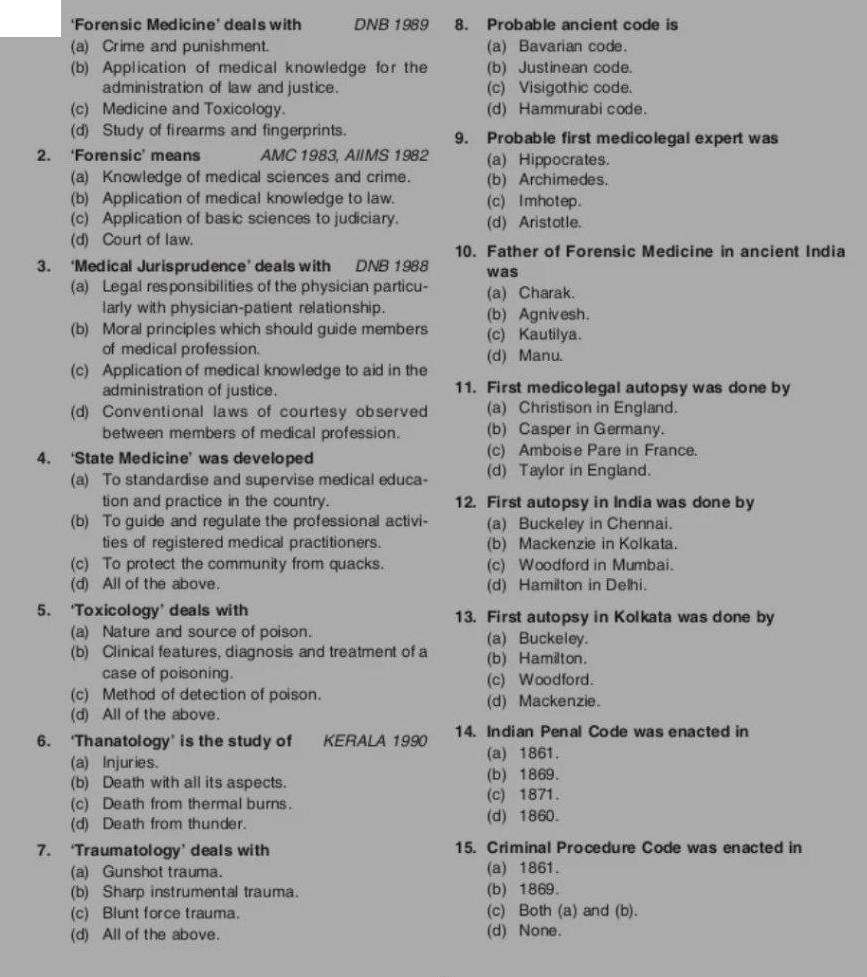Answered step by step
Verified Expert Solution
Question
1 Approved Answer
2. 3. 4. 'Forensic Medicine' deals with (a) Crime and punishment. (b) Application of medical knowledge for the administration of law and justice. (c)

2. 3. 4. 'Forensic Medicine' deals with (a) Crime and punishment. (b) Application of medical knowledge for the administration of law and justice. (c) Medicine and Toxicology. (d) Study of firearms and fingerprints. 'Forensic' means AMC 1983, AIIMS 1982 (a) Knowledge of medical sciences and crime. (b) Application of medical knowledge to law. (c) Application of basic sciences to judiciary. (d) Court of law. 6. 'Medical Jurisprudence' deals with DNB 1988 (a) Legal responsibilities of the physician particu- larly with physician-patient relationship. (b) Moral principles which should guide members of medical profession. (c) Application of medical knowledge to aid in the administration of justice. (d) Conventional laws of courtesy observed between members of medical profession. 5. Toxicology' deals with 'State Medicine' was developed (a) To standardise and supervise medical educa- tion and practice in the country. (b) To guide and regulate the professional activi- ties of registered medical practitioners. (c) To protect the community from quacks. (d) All of the above. DNB 1989 (a) Nature and source of poison. (b) Clinical features, diagnosis and treatment of a case of poisoning. (c) Method of detection of poison. (d) All of the above. Thanatology' is the study of (a) Injuries. (b) Death with all its aspects. (c) Death from thermal burns. (d) Death from thunder. 7. Traumatology' deals with (a) Gunshot trauma. (b) Sharp instrumental trauma. (c) Blunt force trauma. (d) All of the above. KERALA 1990 8. Probable ancient code is (a) Bavarian code. (b) Justinean code. (c) Visigothic code. (d) Hammurabi code. 9. Probable first medico legal expert was (a) Hippocrates. (b) Archimedes. (c) Imhotep. (d) Aristotle. 10. Father of Forensic Medicine in ancient India was (a) Charak. (b) Agnivesh. (c) Kautilya. (d) Manu. 11. First medico legal autopsy was done by (a) Christison in England. (b) Casper in Germany. (c) Amboise Pare in France. (d) Taylor in England. 12. First autopsy in India was done by (a) Buckeley in Chennai. (b) Mackenzie in Kolkata. (c) Woodford in Mumbai. (d) Hamilton in Delhi. 13. First autopsy in Kolkata was done by (a) Buckeley. (b) Hamilton. (c) Woodford. (d) Mackenzie. 14. Indian Penal Code was enacted in (a) 1861. (b) 1869. (c) 1871. (d) 1860. 15. Criminal Procedure Code was enacted in (a) 1861. (b) 1869. (c) Both (a) and (b). (d) None.
Step by Step Solution
★★★★★
3.40 Rating (147 Votes )
There are 3 Steps involved in it
Step: 1
The correct answers with proper explanations are given below 1 b Application of medical knowledge for the administration of law and justice Explanatio...
Get Instant Access to Expert-Tailored Solutions
See step-by-step solutions with expert insights and AI powered tools for academic success
Step: 2

Step: 3

Ace Your Homework with AI
Get the answers you need in no time with our AI-driven, step-by-step assistance
Get Started


